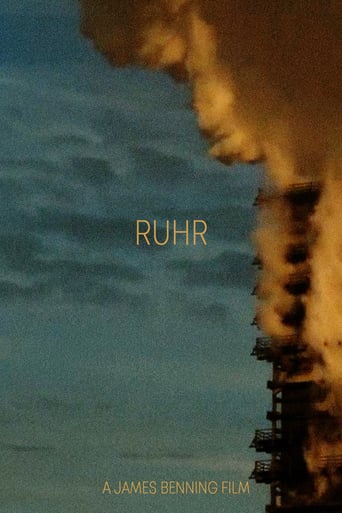oOgiandujaOo_and_Eddy_Merckx
This is the first film that James Benning has made outside of the US and the first in digital. I don't think however that for him he felt much out of place. He comes from Milwaukee, and he describes it as being similar to Duisburg, where Ruhr is shot. Milwaukee is in the "Rust Belt", and there's a large steel and manufacturing industry there that's contracting as time goes on. In Milwaukee poor whites are played off against poor blacks. In the Ruhr it's the same except there are Turks instead of blacks.Ruhr is a film about observation. James Benning attended the Duisburg film festival twice and ran masterclasses there. He sent his students out around the surrounding area with instructions to look and listen. The seven entirely static shots in this movie are then based upon the results of those investigations. The locations are as follows:1. The Matenastraße Tunnel 2. HKM Steelworks 3. Wood outside Düsseldorf International Airport 4. Marxloh Merkez Camii (a mosque) 5. Richard Serra's sculpture "Bramme für das Ruhrgebiet" at Schurenbach 6. Fritzstraße (a residential street) 7. Thyssen Krupp's Schwelgern coke plant (coke as in the purified carbon used in the steel industry)The first six shots take up about an hour, and then the chimney at Scwelgern majestically reigns for the second hour. 1. The lightning strike strip illumination in the Matenastraße Tunnel makes the opening scene feel quite iconic, even if it's fairly minor compared to what's to come. The scene highlights the advantages of digital shooting for Benning. With traditional film stock, even in a motionless picture, you get movement due to the dancing of the grain. Here everything is still, so that when a leaf is blown through the tunnel it's actually dramatic. The tunnel is for road traffic and we see a few vehicles go past. It's very beautiful.2. The HKM steelworks are the backdrop for an automated theatre, a conveyor system for newly cast steel tubing. I say theatre because the system in the foreground, for moving the pipes along, is based on zigzag-toothed screens that move in opposing directions as well as up and down. The visual effect here is the same as used in Renaissance and Baroque theatrical scene design where hand-cranked "ingegni" were used to create the illusion of sea waves. Heat blurs the air through which white and red hot steel pipes appear in the background. It's crazy beautiful. At this point I wondered if I was in for a zigzagathon, given the lightning strike motif in scene one.3. Of the shorter scenes in the first hour, the gloaming shot in the woodland outside Düsseldorf airport is perhaps the most brilliant. The almost black trees are silhouetted against an aqua sky. The calm is splendid, though I couldn't see them I imagined birds sleeping in the trees. The veil of peace is disrupted occasionally by the screeching of jets taking off overhead. A few seconds later the incredible turbulence that the engines cause spirals down hundreds of feet and causes a rain of Autumn leaves. A subtle sad echo of the colossal vortices being created above.4. The mosque scene was difficult to penetrate for me, perhaps that's why Benning lets the backs of supplicants block the shot for the most part.5. Someone sprayed some very pretty graffiti on Richard Serra's "Slab for the Ruhr" on the fifth of August 2005, managing to alleviate some of the work's sombre tone. It's a work of love: one heart shaped graffito containing the phrase "Ich liebe dich meine rose". There's a poignant synergy between the artworks. In the shot, a workman, quite objectionably takes a hose to the graffiti and proceeds to blast it from the iron surface.6. Fritzstraße is fairly unremarkable, but the precious tinkling of piano practise can be heard through a window, and there is some sense of closeness and homeliness.7. Thyssen Krupp's behemoth of a factory is largely cut out of the frame and we see instead one of their two marvellous square-section chimneys gushing into the evening sky. The shot observes the change in colour of the chimney from ochre to almost accentless silhouette over the course of an hour. Sepia smoke billows from the top but also out of the sides of this colossus. I felt a very deep calm come over me for the duration of this segment, a relaxation that reminded me of the cradle. The pulsation of the smoke (the coke purifying requires cold water application to the process every 10 minutes or so) was quasi-erotic, in the sense that it felt somehow intimate without at all being titillating. This is obviously a very personal reaction, many people were bored by it.This shot displays another advantage of the digital process, the shot can remain unbroken for an hour, in the talk after the movie he told the audience that he had a four hour disc should he need to take a shot that long. This beats the standard 11 minutes he was used to before!Also worth noting that there was digital manipulation here, the light effect that looks like it comes from the sun going down, is FX.I saw Ruhr at the London Film Festival on the 14 October 2010, which was the British premiere. The film was shown at the Duisburg Film Festival in late 2009 and German television around the same time.And this is for Mollie.

